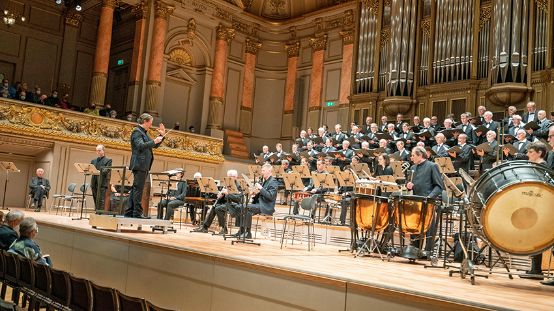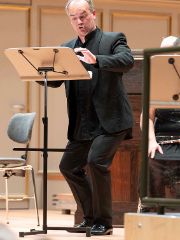Zurich Male Choir: O Lord, do you sleep?
"Music in dark times 1914-1943": Classical music concerts are rarely as topical as the latest program by the Zurich Male Choir.

Choirmaster Roger Widmer let the last notes fade away for an almost provocatively long time, only slowly lowering his hands one after the other, forcing silence. Or rather, he prevented the well-deserved applause from immediately wiping away the deep impression that Bohuslav Martinů's Field fair at the end of a courageous and unfortunately incredibly topical program.
Accusation and fear
The program was courageous in several respects. The pieces that the Zurich Male Choir and the Stadtharmonie Oerlikon-Seebach undertook were not easy. Although they are not among the most technically advanced compositions of the musically turbulent 30 years between 1914 and 1943, the stormy development of the musical language of the time is nevertheless palpable in them. The frequent dissonances in particular, which can certainly be associated with pain in the context of the common theme, presented the choir with a number of challenges. This was most clearly recognizable in Kurt Weill's Berlin Requiem from 1928 based on texts by Bertolt Brecht. However, despite some uncertainties, the choir and ensemble managed to present the indictment against warmongers, as the work could be summarized, in a powerful way.
The two soloists Matthias Aeberhard and Robert Koller, who had stepped in at short notice for Marc Olivier Oetterli, naturally played their part in this. Tenor Aeberhard in particular lent the cynical ballad Marterl the vocal mellifluousness which, in combination with the laconic account of atrocities committed, gave the piece its repulsive effect.
-

Robert Koller. Photo: Peter Lacher
The Berlin Requiem is a work that uses linguistic and musical drasticness to shake things up, to make a difference. Despite perhaps differing compositional means, it was not alone in this concert, on the contrary. All of the works reported on the devastation caused by violence and thus presented the audience with challenges that should not be underestimated. There was no sunshine after the rain, no winter storm gave way to a merry moon. However, the cleverly put together program did not leave you despairing in the darkness, but at least allowed you a few rays of hope.
Gustav Holst's song sung at the beginning shimmers with A Dirge for Two Veterans (A dirge for two veterans) ghostly between mourning and the pomp of a solemn procession. The work, composed in 1914, thus precisely reflects the mixture of naïve enthusiasm for the war and justified fear that prevailed at the beginning of the First World War. And Benjamin Britten's 1943 composition Ballad of Little Musgrave and Lady Barnard ends after Lord Barnard's murder of his wife and her lover not with sounds of horror, but in the light tones of the lord's realization, whose calming pulse enables him to understand that he has committed an injustice. Only Samuel Barber's A Stopwatch and an Ordnance Map, 1940) remains in silent, infinite grief over the loss of his comrade.
Sadly topical
The date of the concert, March 12 in the Tonhalle Zurich, was also courageous. For choirs in particular, planning performances is still a risky business despite the easing of coronavirus measures. And when the date was set, the signals for opening up were not yet clear. At that time, it was even harder to imagine how close the war theme of this program would have come to us. What was perhaps planned as a look back at difficult times, as an indication that there are worse things than corona measures, suddenly became a commentary on events in the here and now, 1500 kilometers away from Zurich.
It's a damned thing: you always hope that a concert will be more than just the mere reproduction of sounds. That somehow a bridge would be built between the music and our lives. And when it happens, you don't really want to be happy about it. At least on this evening, with this subject matter. But in the end, fortunately, the music had the last word.
On the one hand, because Martinůs Field fair is a work that must be heard. Unrestrained in anger and strong even when looking back wistfully. A furor that culminates in the accusing question "O Lord, are you asleep?" and yet finds comforting confidence afterwards.
Secondly, because everyone involved was on top form here. The choir radiated the confidence that had been lacking at times in Weill's work, the ensemble under the tonal leadership of Andreas Gohl-Alvera on the piano and Mark Richli on the harmonium commented attentively and sharply. And baritone Robert Koller proved that he can not only sing, but also has a distinct acting talent. The visibly moved audience would probably not have needed Roger Widmer's skillful applause delay - they would probably have had to take a deep breath before clapping.








